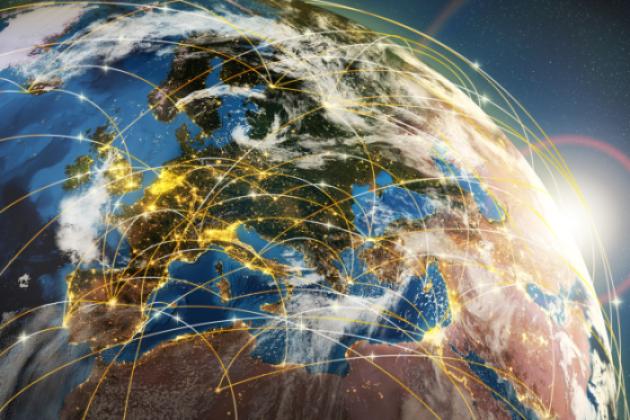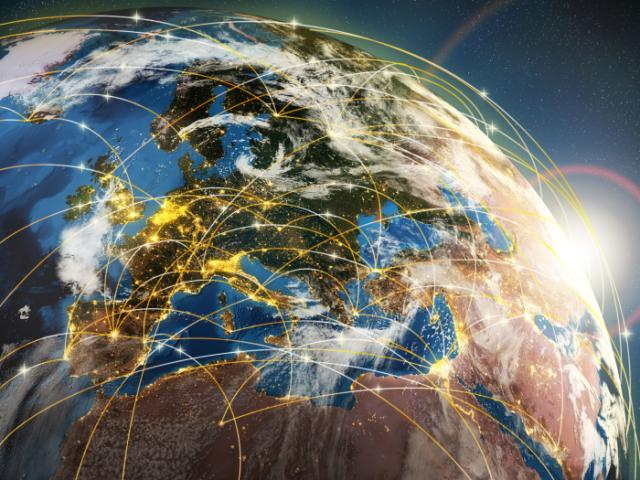The Mediterranean is destiny, the cradle of our civilization. Think Mesopotamia, Egypt, and Persia, then Jerusalem, Athens, and Rome. What the Romans called “Mare Nostrum”—our sea—joined three continents. It was the highway of trade and culture, conquest and war. The basin was practically the world then, and a constant object of desire. This is where civilizations clashed and empires rose and fell for millennia.
In the Age of Discovery (1500 ff.), the arena expanded into the Atlantic, the Indian Ocean, and the Pacific. This is where until 1945 the great wars were fought out, on land and on the seas. As a result, the Mediterranean became “smaller.” In the 20th century, this theater lost its centrality, though not its importance. Unlike Venice, Habsburg-Spain, and the Ottoman Empire, the key powers were no longer abutting on the Med: the U.S., Britain, Germany, Russia, Japan, and now, China. The contest became world-wide, and the Med contracted into a battlefield for regional powers, notably Israel and the Arabs. The U.S. and the U.S.S.R. did stake out their claims, but never fought each other in the one million square miles extending from Agadir to Aleppo.
The fate of the Sixth Fleet highlights the Med’s declining role in the 2000s. As a permanent presence, the Fleet began to shrink to the point where only one command ship was permanently on duty, with major combatants steaming in and out as needed. Note also the “pivot to Asia” under Barack Obama. The Soviet Union was gone, and so was the worst strategic threat in and around the basin. Nor were new rivals roiling the waters, and the northern littoral was in the hands of NATO members from Spain to Turkey, with Israel and Egypt as informal allies.
This friendly climate is no more. De facto, Turkey is an ally in name only. Hosting Russian naval and ground forces, Damascus is back in Moscow’s camp. Iran has bought itself a border on the Med with the help of Hamas (Gaza) and Hezbollah (Lebanon) while building a land bridge across Iraq and Syria. Beset by poverty and Islamism, Egypt is no longer a pillar of stability, let alone a strategic actor. Tunisia is in turmoil, and Libya a playground of warlords.
Add the threat of resource war. Israel estimates that its seabed contains around 75 trillion cubic feet of gas and 6.6 billion barrels of oil. Mainly offshore in waters eyed by hostile Turkey and within range of Hezbollah missiles, this bounty makes for a natural flash point. Such risks must be weighed against the good news, which is the declining relative importance of Arab fossil riches now further diminished by the U.S. as the world’s largest oil producer (ahead of Saudi Arabia and Russia).
Yet the overall prospects are not rosy for the United States. Russia is back, Iran is expanding, Ankara is edging toward Moscow, and volatility lurks from Cairo to Tripoli on the southern littoral. On the plus side is the strategic realignment from Greece to the Gulf. Athens is closing ranks with Washington and Jerusalem. Israel is no longer the focus of all Middle East hatreds, but enjoying an informal alliance with the Sunni powers against Iran.
The upshot, though, is that America’s dreams of extracting itself from the vicious struggles of the Eastern Med (and adjacent lands) have been evaporating. Barack Obama’s visions have turned into illusions. Drawing down U.S. forces in Iraq brought on the rise of ISIS. Refusing to engage in Syria was to issue an invitation to Russia and Iran. Obama thought he could recruit Tehran by distancing the U.S. from Israel and the Sunni powers. Instead, he fueled Iranian ambitions. To call such miscalculation foolish is no exaggeration.
Ironically, Donald Trump, for all his bluster, is hardly Obama’s strategic antipode. He, too, suffers from withdrawal symptoms. U.S. forces in Iraq are down to 5,000, in Syria to 2,200, with a “measurable decrease” still to come, according to unnamed officials. If the U.S. leaves Afghanistan, as the engagement with the Taliban suggests, so will all of America’s allies. Naturally, a radical Islamist regime, though far away, will have repercussions all the way to the Med. It will encourage Moscow and Tehran while prompting local players to recalculate their interests and commitments. Retraction from the Hindu Kush to the Levant will not improve America’s standing in the Greater Middle East.
The proper antidote to entrapment in the region’s endless wars is not abandonment. Maybe the Middle East has become less important economically because of declining dependence on Arab/Iranian oil. Maybe, it is wiser to disentangle from the irreconcilable conflicts of the area. But the international system abhors a vacuum, and so hostile powers invariably move in. Those who leave, as the history of post-WWI Europe shows, will have to come back at a far higher risk and price.
















